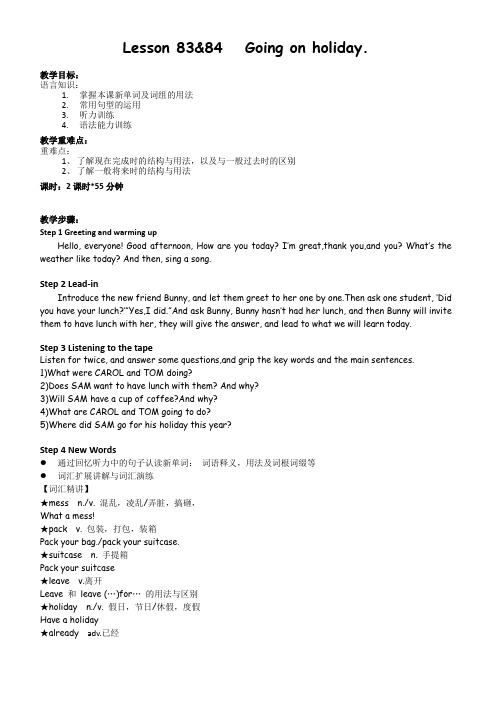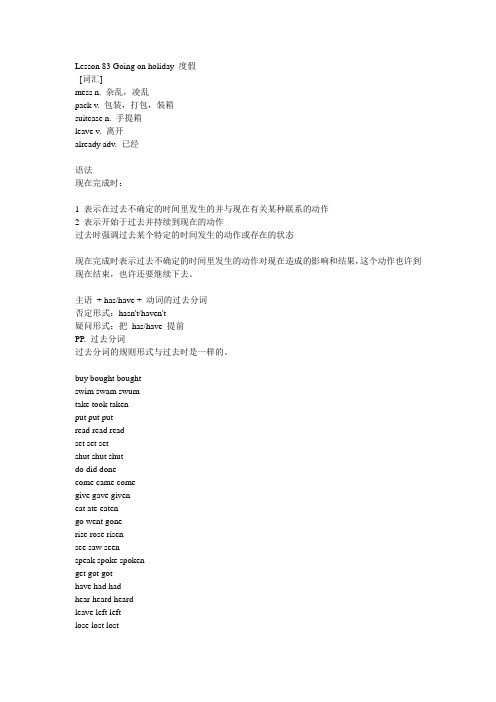新概念第一册第83--84教案
- 格式:doc
- 大小:32.00 KB
- 文档页数:2



每日一句:Idleness is the root of all evil.懒惰是万恶之源Lesson 83 ・ Going on holiday & Lesson 84 • Have you had...?一.教学重点词法:have的两种词性.2,时态:现在完成时VS —般过去时(注意时间状语标志词).3,句型:-Have you/he/she/they had...? -Yes, l/they have. / No, l/they haven't.-Yes, he/she has. / No, he/she has n't.I/They've had... = l/They have had... He/She's had... = He/She has had...二.教学步骤(一)引入:Last lesson, we learned that Carol went to Sam and Tom's house.上节课我们知道卡罗尔到萨姆和汤姆家里做客。
今天我们要学习的课文,还是在这三个好刖友Z间展开,而萨姆又来他们家做客。
This time, they are talking about holiday.这一次他们乂开始讨论假期旅游的事情了。
Let's see what they are talking about.我们来看看他们有聊了什么呢?在听课文之前,我的问题是:Where did Sam go for his holiday this year? (二)单词讲解:Mess音:自然拼音教授;形:me\ss两部分,抢答义:It means dirty and untidy.杂舌L, 凌乱用:Excuse the mess. Look at the mess. Her hair was in a terrible mess ・她的头发乱极了。


Lesson 83&84 Going on holiday.教学目标:语言知识:1.掌握本课新单词及词组的用法2.常用句型的运用3.听力训练4.语法能力训练教学重难点:重难点:1、了解现在完成时的结构与用法,以及与一般过去时的区别2、了解一般将来时的结构与用法课时:2课时*55分钟教学步骤:Step 1 Greeting and warming upHello, everyone! Good afternoon, How are you today? I’m great,thank you,and you? What’s the weather like today? And then, sing a song.Step 2 Lead-inIntroduce the new friend Bunny, and let them greet to her one by one.Then ask one student, ‘Did you have your lunch?’”Yes,I did.”And ask Bunny, Bunny hasn’t had her lunch, and then Bunny will invite them to have lunch with her, they will give the answer, and lead to what we will learn today.Step 3 Listening to the tapeListen for twice, and answer some questions,and grip the key words and the main sentences.1)What were CAROL and TOM doing?2)Does SAM want to have lunch with them? And why?3)Will SAM have a cup of coffee?And why?4)What are CAROL and TOM going to do?5)Where did SAM go for his holiday this year?Step 4 New Words●通过回忆听力中的句子认读新单词:词语释义,用法及词根词缀等●词汇扩展讲解与词汇演练【词汇精讲】★mess n./v. 混乱,凌乱/弄脏,搞砸,What a mess!★pack v. 包装,打包,装箱Pack your bag./pack your suitcase.★suitcase n. 手提箱Pack your suitcase★leave v.离开Leave 和leave (…)for…的用法与区别★holiday n./v. 假日,节日/休假,度假Have a holiday★already adv.已经通常放句首部分,主语之后,或放句末。

Lesson 83 Going on holiday 度假[词汇]mess n. 杂乱,凌乱pack v. 包装,打包,装箱suitcase n. 手提箱leave v. 离开already adv. 已经语法现在完成时:1 表示在过去不确定的时间里发生的并与现在有关某种联系的动作2 表示开始于过去并持续到现在的动作过去时强调过去某个特定的时间发生的动作或存在的状态现在完成时表示过去不确定的时间里发生的动作对现在造成的影响和结果,这个动作也许到现在结束,也许还要继续下去。
主语+ has/have + 动词的过去分词否定形式:hasn't/haven't疑问形式:把has/have 提前PP. 过去分词过去分词的规则形式与过去时是一样的。
buy bought boughtswim swam swumtake took takenput put putread read readset set setshut shut shutdo did donecome came comegive gave giveneat ate eatengo went gonerise rose risensee saw seenspeak spoke spokenget got gothave had hadhear heard heardleave left leftlose lost lostmake made mademeet met metsend sent sentsweep swept swepttell told toldcut cut cutfind found foundI see a film every week.My mother sees a film every week.I saw a film last week.I have seen the film.I haven't seen the film.Have you seen the film?do did doneI do my Homework every day.My sister does her Homework every day.I did my Homework the day before yesterday.I have done my Homework.I haven't done my Homework.Have you done your Homework?Has she done her Homework?have had hadhave lunchI have lunch at 12 o'clock every day.I had lunch at 12 o'clock yesterday.I have had lunch.I haven't had lunch.Have you had lunch?已经强调过去不确定时间发生的动作或状态对现在的影响,而且也有可能继续下去。
Lesson8384 Going on a holidayLeadinWhere did you go for your holiday?Where do you want to go for your holiday?____________________________________________________________________Now,let’s listen to the tape and answer the following questions:Where did Sam go for his holiday this year?____________________________________________________________________Words and phrasesmess pack suitcaseleave holidayConversationCarol:Hello, Sam. e in!Tom:Hi, Sam. We’re having lunch. Do you want to have lunch with us?Sam: No, thanks, Tom. I’ve already had lunch. I had lunch at half past twelve.Carol: Have a cup pf coffee then.Sam:I’ve just had a cup, thank you. I had one after lunch.Tom:Let’s go into the living room ,Carol! We can have our coffee there.Carol:Excuse the mess, Sam. This room’s very untidy. We are packing our suitcases. We are going to leave tomorrow.Tom and I are going to have a holiday.Sam :Aren’t you lucky?Tom:When are you going to have a holiday,Sam?Sam:I don’t know. I’ve ready had my holiday this year.Carol: Where did you go?Sam: I stayed at home!Read the conversation,answer the question as follows:1.What are Tom and Carol doing?_________________________________2.Is the room tidy?_________________________________3.Have Sam had a cup of coffee?_________________________________4.Where are Tom and Carol going to do?_________________________________Language pointse in作动词短语,含义为进来类似短语:e on 加油 e from 来自=be from翻译:加油!你可以做到的!________________________________________________Lily来自北京。
词汇学习Word study
1.leave v.
(1)离开,出发:
The train is going to leave in 5 minutes. 火车将于5分钟后开出。
I'm going to leave Italy. 我准备离开意大利。
(2)舍弃;脱离:
John's wife left him for another man. 约翰的妻子舍他而去,投入另一个男子的怀抱。
Alexander is leaving the company after 30 years' service 亚历山大将在为公司服务了30年之后离开公司。
(3)留给,遗留;委托:
The famous actress left all her money to charity. 这位著名的女演员将她所有的钱都遗留给了慈善机构。
…Leave it to me, ‟he said.“这事交给我来办吧,”他说道。
2.pack v.
(1)打包,装箱:
We are leaving tomorrow and I haven't even started packing yet.
我们明天就要走了,而我甚至还没开始将行李打包呢。
Don' t forget to pack the mirror! 别忘了把镜子装起来!
(2)挤满,塞满:
The movie fans packed the hall. 大厅里挤满了影迷。
The bus was packed with people. 公共汽车里挤满了人
课文详注Further notes on the text
1.Come in. 进来吧。
Have a cup of tea then. 那么喝杯咖啡吧。
Let's go into the living-room, Carol. 我们到客厅里去吧,卡罗尔。
这3句都是祈使句。
表示请求或命令的句子叫祈使句。
祈使句中主语you常不出现,谓语动词用原形,句末用感叹号或句号。
读时用降调。
2.I've just had a cup. 我刚喝了一杯。
句中cup后省略了of coffee。
3.We're going to leave tomorrow. 明天我们就要走了。
这里的are going to表示“打算”、“准备”。
语法Grammar in use
现在完成时
(1)在英语中,现在完成时主要用于以下两种情况:或者表示在过去不确定的时间里发生的并与现在有着某种联系的动作;或者表示开始于过去并持续到现在的动作。
本课中萨姆所面临的是第1种情况,正是因为他吃了饭,喝过了咖啡,也休过假,因此他谢绝了汤姆的邀请,并表示今年已无可能再次休假。
(2)现在完成时在汉语中常用“了”、“过”或“已经”来表示。
(3)现在完成时由have/has+ 过去分词构成,单数第3人称用has,其他人称皆用have。
规则动词的过去分词与过去式相同,而不规则动词的过去分词则无统一的规律可言,需特别加以记忆。
(4)一般现在完成时通常与表示不确定的时间副词或短语连用如just, already, before, never, ever, twice, three times等。
练习答案Key to written exercises Lesson 84
A1 I've already had some. 2 I've already had one. 3 I've already had one. 4I've already had some. 5 I've already had one. 6 I've already had one.
7 I've already had some.
B1 He hasn't had any beans. He's just had some peas.
2 They haven't had any tea. They've just had some coffee.
3 I haven't had any apples. I've just had some peaches.
4 I haven't had any cabbage. I've just had some lettuce.
5 She hasn't had any beer. She's just had some wine.
6 He hasn't had any lamb. He's just had some beef.
7 They haven't had any tea. They've just had some milk.
8 She hasn't had any meat. She's just had some vegetables.
9 I haven't had any chicken. I've just had some steak.
10 They haven't had any bananas. They've just had some oranges.。